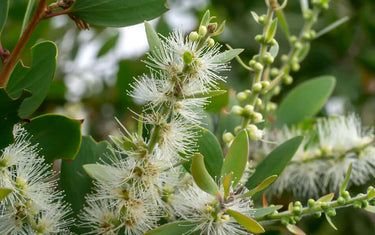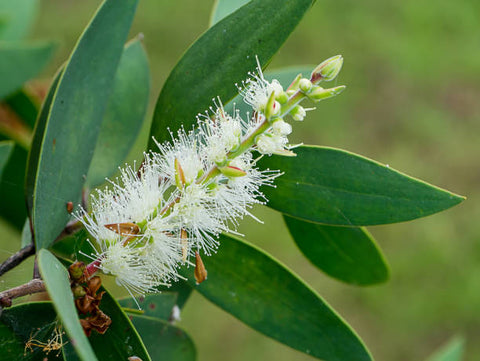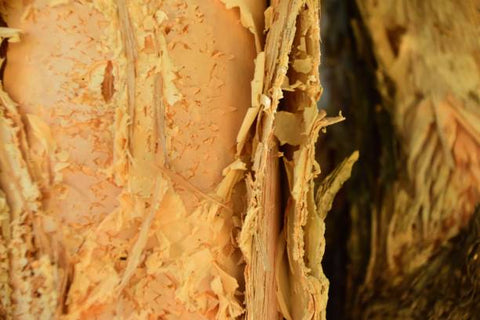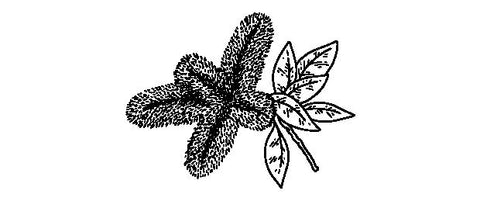8 min read / 10 January 2024 / yasmin sharp
10 Benefits and Uses of Niaouli Oil
Niaouli essential oil is useful for many types of deep cleaning - even teeth.
Share this post

Niaouli oil has been used for hundreds of years, with the Kanaks of New Caledonia finding it to be patricianly effective at treating wounds and infections.
Over the years, the Melaleuca quinquenervia tree the oil is extracted from has been affectionately referred to as a “paperbark” tree due to its soft exterior, allowing it to be easily pulled off and torn like paper.
As you’ll discover below, there are plenty of niaouli oil benefits that can be extracted from its natural properties, providing the kind of support our minds and bodies need to remain strong and healthy.
What is niaouli oil?Niaouli essential oil is extracted via steam distillation from the leaves and twigs of the niaouli tree, which is native to New Caledonia, Papua New Guinea and coastal eastern Australia. Although the niaouli is a member of the eucalyptus family, it is often confused with tea tree oil, as they share similar aromatic traits and some of the same natural properties. The oil offers a host of fantastic health benefits, although it is not commonly used in aromatherapy due to its strong scent, but it tends to blend very well with other essential oils that are earthy, fresh or citrusy. |
How does niaouli oil work?
Common niaouli oil uses include aromatherapy, topical application, medicinally and in candle and soap recipes.
This allows the oil to work in different ways, with its natural properties interacting with various parts of the body to help your wellbeing.
The cooling, cleansing aroma of the oil can help to open the airways and promote better breathing, whilst also clearing the mind and providing better clarity and emotional stability.
Niaouli oil is also known for its antiseptic properties that can discourage infections, helping to protect and cleanse the skin.
Antiviral and anti-inflammatory qualities are also present, giving the body even more tools to combat a host of conditions and ailments.

What are the benefits of niaouli oil?
To test the benefits of niaouli essential oil, you could use it to:
1. Provide antiseptic properties
Niaouli’s natural antiseptic properties allow it to be used against a variety of harmful microorganisms, which can help to ease bodily irritation.
The Kanaks (the indigenous Melanesian inhabitants of New Caledonia) are known for using the oil to address a host of medical issues.
The oil was used to make a poultice that was applied to prevent healing and quicken the healing process.
In more recent times, a 2013 study found that niaouli essential oil displayed strong antifungal activity, which means it could be used to increase protection against various bacteria and infections. [1]
2. Improve oral health
Niaouli essential oil is well known for its deep cleaning abilities, which may also extend to attacking the causes of tooth decay.
Research published in 2012 showed that the oil displayed strong antimicrobial activity against S.mutans – the organism largely responsible for the formation of dental plaque. [2]
This could explain why using niaouli oil to pull teeth is such a common practice, with its natural properties helping to improve oral health.
To try this at home, mix 1-2 drops of niaouli with a carrier oil and swirl it around the mouth before spitting out.
Learn more about how to oil pull with essential oils.
3. Cleanse and brighten skin
The strong antibacterial properties of niaouli oil make it ideal for use on skin, helping to cleanse pores and remove harmful bacteria.
For most people, providing the oil is properly diluted, it does not irritate the skin, slowly working to soothe and treat certain conditions such as acne and similar small imperfections.
Once you have diluted niaouli essential oil with a carrier oil, gently sweep it over the face to improve the condition of your skin, which could lead to a brighter, more revitalised look.
4. Help to strengthen immunity
The benefits of niaouli oil also mean it could stimulate blood circulation, metabolic processes and the secretion of enzymes and hormones.
This could be the reason why it is able to strengthen immunity, helping the body to safeguard itself against an array of infections.
In 2008, researchers found that cellular immunity was promoted by niaouli. [4]
Tests showed that the oil encouraged T-cells to attack infected cells, which subsequently reduced infection levels in the body.
Perhaps the immunostimulant qualities of the oil is the reason why the Kanaks were the first to notice how niaouli oil benefits the body, which led them to associate the tree with strength.
5. Ease the sensation of heavy legs
If your legs feel stiff, tired or weighted, it can be referred to as having heavy legs (also known as venous insufficiency).
The condition is usually caused by poor circulation, causing heaviness in the legs due to poor blood flow to the heart.
This may be a condition that can be eased with the topical application of niaouli oil, helping to improve blood circulation and slowly easing tiredness or stiffness in the legs.
This is something you can do at home, by diluting niaouli oil with a carrier oil and gently rubbing it into the skin, leaving it to soak into the pores to relax and improve the vitality of your legs.

6. Relax and calm the mind
In aromatherapy, niaouli essential oil is used as a relaxer, providing a sense of calm and comfort for many struggling to cope with feelings of stress and anxiety.
The oil has a distinct camphoraceous aroma that in some respects is similar to tea tree oil and eucalyptus oil, although it is more subtle.
Diffusion is a popular choice for many people, allowing the aroma to disperse around the home to provide clarity of thought and a more balanced emotional state.
Alternatively, you can inhale the oil directly from the bottle, or add 1-2 drops to a tissue or cotton ball and inhale as and when needed.
7. Reduce inflammation
According to one study published in 2019, niaouli oil benefits may also extend to reducing inflammation and some of its associated symptoms. [5]
The oil contains compounds such as viridiflorol, 1,8-cineole, terpinene and limonene, which have all been shown to display anti-inflammatory activity.
One study demonstrated that extracts taken from the leaves of the Melaleuca quinquenervia plant produced gastro-protective effects due to its antioxidant and anti-inflammatory properties. [6]
It suggests that niaouli oil could have a positive effect on pain and fever.
Although more research is needed, this could mean that niaouli essential oil may be able to alleviate the pain and hyperthermia that accompany inflammation.
8. Improve respiratory conditions
Niaouli oil is part of the eucalyptus family, and also contains some of the same properties, which means it could be used to ease certain respiratory conditions, helping to open airways to make it easier to breathe.
The presence of the compound cineole could be key, as it may provide anti-inflammatory, mucolytic and broncho-dilating properties that can improve breathing patterns.
A 2014 study involved 242 patients with acute bronchitis who were each administered 3 x 200mg of cineole, or a placebo, every day for 10 days. [7]
After only 4 days, researchers noted a significant improvement in symptoms, reducing cough frequency to make the condition easier to manage.
9. Act as an insect repellent
Although research is in its early stages, initial test results indicate that the benefits of niaouli oil may allow it to be used as a natural insect repellent.
In 2006, researchers tested 41 plant extracts and 11 oil mixtures against various insects that are responsible for causing diseases such as yellow fever, malaria, filariasis and encephalitis. [8]
Human volunteers were involved in the process, which helped the scientists to discover the repellence and protection time.
Niaouli oil was highlighted as being one of five oils offering the most protection, inducing a protection time of 8 hours and 100% repellence.
However, it was noted that a “peculiar” formulation is required in order for it to be effective on human skin.
10. Be used as a hand sanitiser
The antibacterial and antiseptic properties of niaouli could allow it to be used as an ingredient in a homemade hand sanitiser.
It can be mixed with other ingredients, such as isopropyl alcohol and aloe vera gel, to make an effective cleanser for your hands.
However, it should be noted that homemade hand sanitisers should only ever be used in situations where hand washing isn’t available.
They should never be used on children’s skin as it could cause irritation issues and if left unsupervised, could lead to injury or harm.

How do you use niaouli oil?
Niaouli oil uses and benefits can help the body in many ways.
This gives you the option to use it:
As a massage oil
The potential anti-inflammatory benefits of niaouli oil make it ideal for topical application, with its natural properties helping soothe muscles and joint pain.
To try, simply mix 5 drops of niaouli oil to 10ml of carrier oil and massage evenly into the required areas.
As an aromatherapy oil
The strong scent of the oil is not for everyone, which is why aromatherapy uses of niaouli oil are not too common.
However, its potent properties can offer a host of health benefits, especially when used in combination with other oils.
Add a few drops to a diffuser and allow the aroma to disperse or mix 5-7 drops with water and add to an oil burner to calm and relax the mind.
What is the history of niaouli oil?
The Kanak people were pioneers of niaouli oil, making the most of its cleansing properties, whilst also holding a firm belief that it was able to provide and enhance strength.
In fact, niaouli oil was so revered by the Kanaks that newborn babies were wrapped in the leaves of the tree for protection.
A French industrialist first introduced the oil to the western world, after learning about its healing power from indigenous people.
And, soon afterwards, it found use as an anti-infection agent in French hospital obstetric wards.
Research has since discovered much more about the oil’s potential, with its properties proving to be tough on harmful microorganisms and a host of other threats to our health.

Niaouli oil FAQs
Is niaouli the same as tea tree oil?
Whilst there are some aromatic similarities to tea tree oil, there are some important differences that make niaouli distinct.
It is fuller and sweeter than tea tree oil, with a spicy undertone that makes it smell slightly less medicinal.
In terms of smell, niaouli oil also has similarities to eucalyptus oil.
Is niaouli essential oil good for hair?
It is believed that niaouli essential oil can promote shine and volume and improve dryness control, whilst also providing dandruff control.
Once diluted and applied to the scalp, it can cleanse the scalp, balance PH levels and strengthen hair follicles to reduce breakage.
What are the risks of niaouli oil?
Ideally, niaouli oil should not be consumed as it can affect blood circulation, blood pressure and trigger breathing problems.
Before applying diluted niaouli to large areas of skin, you should first complete a patch test to test for irritation or potential allergies.
Nikura niaouli essential oil is not intended for consumption.
[1] Luiz Claudio Almeida Barbosa et al. (2013) Chemistry and biological activities of essential oils from Melaleuca L. species https://www.researchgate.net/publication/279937363_Chemistry_and_biological_activities_of_essential_oils_from_Melaleuca_L_speciesv
[2] Lívia Câmara de Carvalho Galvãoe et al. (2012) Antimicrobial Activity of Essential Oils against Streptococcus mutans and their Antiproliferative Effects https://www.ncbi.nlm.nih.gov/pmc/articles/PMC3368214/
[3] https://nikura.com/blogs/discover/how-oil-pulling-with-essential-oils-can-improve-your-oral-health
[4] Sang-Yun Nam et al. (2008) Essential oil of niaouli preferentially potentiates antigen-specific cellular immunity and cytokine production by macrophages https://pubmed.ncbi.nlm.nih.gov/18668393/
[5] E. Acha et al. (2019) Anti-inflammatory Properties of Melaleuca Quinquenervia (Cav.) ST Blake Myrtaceae (Niaouli) Leaves’ Essential Oil https://www.semanticscholar.org/paper/Anti-inflammatory-Properties-of-Melaleuca-%28Cav.%29-ST-Acha-A%C3%AFkpe/c32476aee62fb66797a1535992c5f3f03c576fd9
[6] Ozlem T. Cilingir-Kaya et al. (2022) Therapeutic potential of essential oil of Melaleuca quinquenervia (Myrtaceae) in a rat model of ethanol-induced peptic ulcer https://www.ajol.info/index.php/tjpr/article/view/220479
[7] Juergen Fischer et al. (2013) Efficacy of cineole in patients suffering from acute bronchitis: a placebo-controlled double-blind trial https://www.ncbi.nlm.nih.gov/pmc/articles/PMC3842692/
[8] Abdelkrim Amer et al. (2006) Repellency effect of forty-one essential oils against Aedes, Anopheles, and Culex mosquitoes https://pubmed.ncbi.nlm.nih.gov/16642384/










